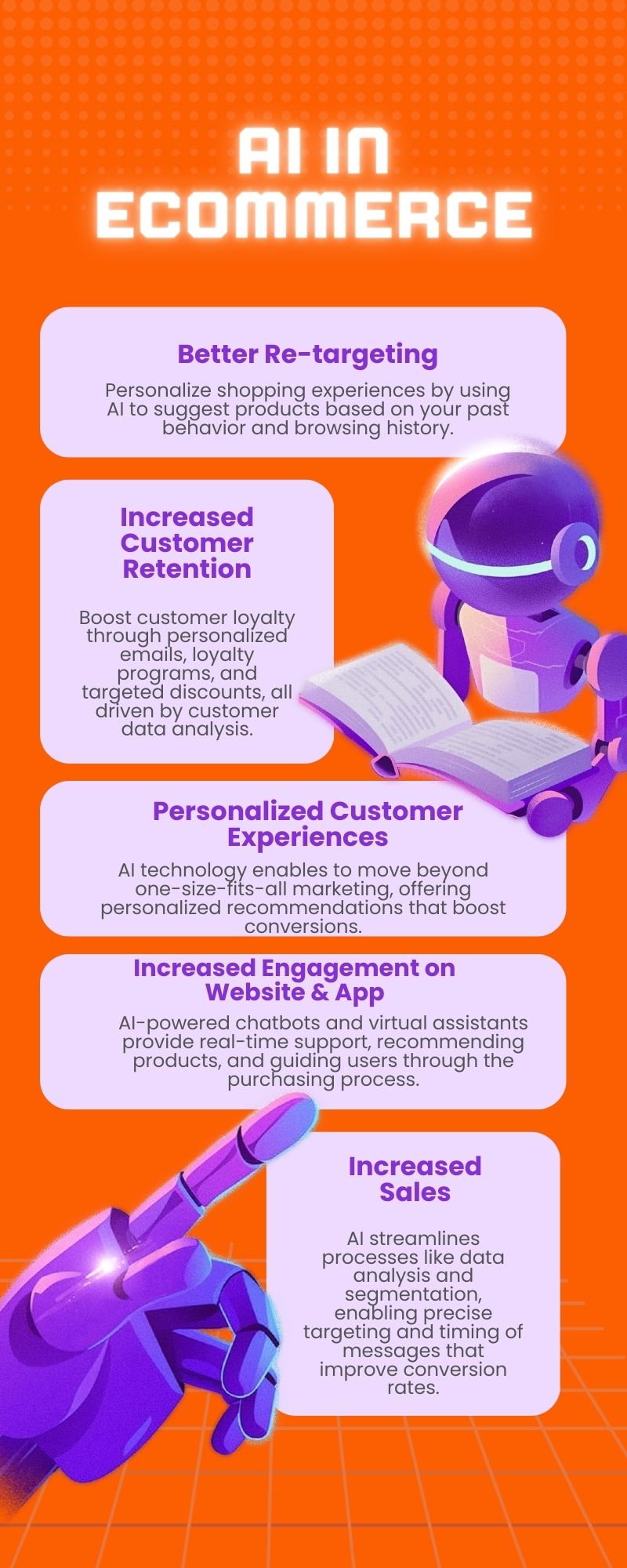The use of AI in ecommerce has made a huge impact on this mature industry. From predictive analysis to personalized recommendations, AI has empowered businesses to optimize operations and enhance customer experiences.
In fact, e-commerce brands that have adopted AI in their strategies have successfully generated 20% additional revenue and reduced costs by 8%. This kind of impact has not only garnered attention, but those who don’t jump on the AI bandwagon stand to lose out on meaningful revenue.
In this blog, we explore the transformative impact of AI in ecommerce through real-world examples and actionable insights. Discover how leading brands leverage AI-driven strategies to drive sales, boost customer engagement, and stay ahead in the competitive online marketplace. Join us as we delve into the world of AI in ecommerce, uncovering its myriad benefits, strategies, and impactful use cases.
What are the benefits of AI in ecommerce marketing?

1. Better Re-targeting
Ecommerce businesses have started delivering personalized shopping experiences by leveraging predictive analysis. Platforms like Amazon use AI algorithms to recommend products based on past purchases, browsing history, and user behavior. You would have come across sections such as “People also bought” or “Deals related to your views” on the app or website.
By understanding customer preferences, ecommerce businesses can tailor advertisements and promotions to specific individuals, increasing the likelihood of conversion.
2. Increased Customer Retention
AI-powered data-driven decision-making facilitates targeted marketing efforts to increase customer retention. Netflix, for example, uses machine learning algorithms to analyze viewing habits and recommend content tailored to each user’s interests. By analyzing customer data, ecommerce companies can implement strategies such as personalized email campaigns, loyalty programs, and targeted discounts to keep customers engaged and loyal.
3. Personalized Customer Experiences
Personalization is the need of the hour. A generic or one-size-fits-all marketing effort will not make the cut. AI technology enables ecommerce businesses to deliver personalized recommendations, content, and promotions, enhancing customer satisfaction and driving conversions.
4. Competitive Advantage
Leveraging AI today is table stakes. Ecommerce businesses that embrace AI technologies gain a competitive edge by offering superior customer experiences, streamlining operations, and staying ahead of market trends, positioning themselves for long-term success in the digital marketplace.
5. Increased Engagement on Website & App
AI technologies enhance engagement on ecommerce platforms by offering personalized content and optimizing user experiences. For instance, AI-powered chatbots and virtual assistants can provide real-time assistance to users, answering questions, offering product recommendations, and guiding them through the purchasing process.
6. Increased Sales
AI helps create more efficient processes, be it analyzing data, generating content, segmenting audiences, and implementing strategies. More data makes it easier to target the right prospects with the right message at the right time. This is bound to improve conversion rates, leading to business growth and revenue.
Discover how Healthmug generated 11X ROI in a quarter using Netcore’s Full-stack Customer Engagement Platform.
What are the use cases of AI in ecommerce?
With the pace at which AI is evolving, the AI use cases in ecommerce will only expand. From personalized recommendations to chatbots that enhance customer service, AI is making online shopping smoother and more engaging.
1. Behavior
Behavioral Analysis and Collaborative Filtering
AI-powered ecommerce businesses use algorithms to analyze browsing history, purchase patterns, cart items, and time on product pages.
Through collaborative filtering techniques, AI systems identify patterns and similarities between users with similar preferences and recommend products that other users with similar behaviors have found appealing.
For example, suppose a user frequently purchases running shoes and activewear. In that case, the AI system may recommend related products such as running accessories, workout gear, or fitness trackers based on the preferences of other users with similar purchasing behavior.
This personalized approach enhances the user experience, increases the likelihood of conversions, and fosters customer loyalty.
Content Discovery
Netflix, Spotify, and YouTube use AI-driven personalization to recommend content based on viewing history, ratings, and interactions.
AI algorithms can analyze user behavior and preferences and surface content that matches the user’s interests, thereby increasing user engagement and retention.
For instance, Netflix’s recommendation system uses machine learning algorithms to suggest movies and TV shows tailored to each user’s taste, leading to increased satisfaction and longer viewing sessions.
2. Segmentation
Predicting User Affinity
Ecommerce businesses utilize AI to forecast user preferences, analysing past interactions to anticipate interest in products. A marketplace gathers data like browsing history, purchases, and demographics, feeding it into machine learning models.
These models identify patterns, generating affinity scores for product categories. Based on these scores, personalized recommendations are then offered, enhancing user engagement and sales. Continuous refinement ensures accuracy, with the model learning from ongoing interactions and feedback.
Dynamic Audience Segmentation
Ecommerce businesses leverage AI algorithms to create dynamic audience segments based on a combination of demographic, behavioral, and contextual factors. By analyzing vast amounts of customer data in real-time, AI systems can identify patterns and similarities among customers and group them into segments with shared characteristics and preferences.
For example, let’s consider a clothing retailer specializing in outdoor apparel. Using AI-powered segmentation, the ecommerce platform analyses customer data from various sources, including website interactions, purchase history, social media engagement, and demographic information.
1. Behavioral Segmentation
AI algorithms analyze customer browsing behavior, such as the types of products viewed, time spent on specific pages, and interactions with promotional offers. Customers who frequently visit the hiking gear category, add items to their cart but do not complete the purchase, or regularly engage with outdoor adventure content on social media may be grouped into a segment of “Outdoor Enthusiasts.”
2. Demographic Segmentation
AI systems also consider demographic attributes such as age, gender, location, and income level to refine audience segments further. For instance, customers in regions with a high concentration of outdoor recreational activities may be grouped into a segment of “Mountain Region Adventurers.” In contrast, customers in urban areas may belong to a segment of “City Dwellers Seeking Outdoor Escapes.”
3. Contextual Segmentation
In addition to behavioral and demographic data, AI algorithms take into account contextual factors such as weather conditions, seasonality, and current trends.
For example, the ecommerce platform may create a “Winter Sports Enthusiasts” segment during the colder months, targeting customers interested in skiing and snowboarding with relevant promotions and product recommendations.
4. Dynamic Personalization
The segmentation process is dynamic and continuously evolving as new data becomes available. AI algorithms adapt to changing customer behavior and preferences in real-time, allowing ecommerce businesses to deliver personalized experiences at scale.
For example, if a customer’s browsing behavior shifts from hiking gear to camping equipment, the AI system automatically updates their segment and adjusts the recommendations accordingly.
3. Recommendations
Automated Product Tagging and Attribute Extraction
AI algorithms are employed to automatically analyze images of fashion products and extract valuable attributes such as color, pattern, material, style, and brand. This process, known as automated product tagging, helps ecommerce brands enrich their product catalogs with detailed and accurate metadata, making it easier for customers to search and discover products.
AI-powered image recognition can analyze fashion product images and automatically generate descriptive tags and attributes for each item. This streamlines the catalog enrichment process, reduces manual effort, and ensures consistency in product categorization and labeling.

Style Recommendations and Visual Search
AI-powered visual search offers personalized style recommendations based on customer preferences and browsing history for fashion and e-commerce brands. AI analyzes fashion images to suggest similar catalog items, enhancing the shopping experience and driving sales.
For instance, a customer uploads a photo of a dress they like, and the AI-powered visual search system analyses the image, identifies similar styles from the brand’s catalog, and presents them to the customer as recommendations. This helps customers find new products that match their style, boosting engagement and conversions for the e-commerce brand.
Real-Time Contextual Recommendations
Ecommerce platforms with AI stack use real-time data to deliver personalized product recommendations based on user needs and preferences.
For regular product recommendations, an ecommerce website may consider factors such as the user’s location, weather conditions, time of day, and browsing device to make relevant recommendations. If a user is browsing the website on a cold, rainy day, the AI system may suggest winter coats, umbrellas, or hot beverages based on the current weather conditions.
However, in the case of omnichannel recommendations, brands can deliver timely and contextually relevant recommendations to the users on the channels of their choice.
Check out this list of use cases & examples of maximizing ecommerce sales potential with Omnichannel Recommendations
Product Recommendations
Search personalization in ecommerce provides tailored product recommendations based on browsing history, purchase behavior, and preferences.
AI algorithms analyze this data to understand user preferences and predict products likely to appeal to them. For example, Amazon utilizes AI algorithms to offer personalized product recommendations on its website and app, increasing the likelihood of conversion and enhancing the overall shopping experience.
4. Predictive Analysis
Machine Learning Models for Churn Prediction
Ecommerce businesses leverage machine learning algorithms to analyze historical customer data and identify patterns indicative of potential churn. These models consider purchase history, browsing behavior, interaction frequency, demographics, and sentiment analysis from reviews or customer service.
By training the machine learning models on labeled datasets (where churned and non-churned customers are identified), the AI system can learn to recognize the early warning signs of customer dissatisfaction or disengagement.
For example, an ecommerce platform may use a predictive model to assign a churn probability score to each customer, indicating the likelihood of them leaving in the near future.
Based on these predictions, the business can proactively engage at-risk customers with targeted retention efforts, such as personalized offers, loyalty rewards, or proactive customer support, to prevent churn and improve customer retention rates.
Customer Behavior Analysis and Predictive Segments
Ecommerce businesses employ advanced analytics techniques, including predictive segments, to forecast customer behavior and anticipate potential churn events.
By analyzing a wide range of customer interactions and engagement metrics across various touchpoints (e.g., website visits, email interactions, social media engagement), AI algorithms can identify behavioral patterns that precede churn.
For instance, if a customer’s frequency of purchases or interactions with the brand significantly decreases over time, it may indicate a heightened risk of churn. By applying Raman’s predictive segment techniques, such as time-series forecasting or clustering algorithms, ecommerce businesses can detect these behavioural trends and take proactive measures to mitigate churn.
For example, the business may create journeys and send targeted re-engagement campaigns or personalized recommendations to re-engage at-risk customers and prevent them from leaving.
How will AI in ecommerce transform ecommerce marketing?
As AI advances, its transformative impact on ecommerce marketing is becoming increasingly evident. They allow ecommerce businesses to predict needs, personalize experiences, and optimize marketing strategies like never before.
1. The Magic of Generative AI
Dynamic content creation capabilities have changed the way ecommerce brands market their offerings. From personalized product recommendations to tailored advertising content, Generative AI in ecommerce enables brands to engage customers with highly relevant and compelling experiences.
Try out Netcore Cloud’s AI Content Generator
By leveraging advanced algorithms, ecommerce marketers can now create and deliver content at scale, driving conversion rates and enhancing customer satisfaction by generating data-driven content.
2. Rise of AI-Driven Personalization
Ecommerce platforms have been utilizing AI algorithms to tailor product recommendations, promotions, and content based on individual preferences and behavior. For example, Spotify’s Discover Weekly playlists use AI to curate personalized music recommendations for each user.
3. Integration of Virtual Try-On Technology
Virtual try-on technology powered by AI will become ubiquitous, allowing customers to virtually try on clothes, accessories, and even makeup before making a purchase. Brands like Warby Parker and Sephora already offer virtual try-on experiences, enhancing the online shopping experience and reducing returns.
4. Expansion of Voice Commerce
Ecommerce platforms will integrate voice commerce capabilities, enabling users to make purchases, track orders, and receive customer support using voice commands. Amazon Echo’s integration with Amazon Prime allows users to shop using voice commands, streamlining the purchasing process.
5. Increased Adoption of Augmented Reality (AR)
AR technology will play a significant role in ecommerce marketing, allowing customers to visualize products in their real-world environment before buying. Furniture retailers like IKEA offer AR apps that allow users to preview how furniture will look in their homes, enhancing confidence in purchase decisions.
6. Gamification of the Shopping Experience
Ecommerce platforms will incorporate gamification elements to engage consumers. Loyalty programs, interactive quizzes, and challenges will incentivize purchases and foster brand loyalty. Nike’s SNKRS app gamifies the sneaker-buying experience with exclusive access to limited-edition releases and interactive content.
7. AI-Powered Customer Service
AI-driven chatbots and virtual assistants will provide personalized customer support 24/7, addressing inquiries, resolving issues, and guiding purchase decisions. Sephora’s virtual assistant, Sephora Virtual Artist, assists customers with product recommendations, tutorials, and beauty tips via chat.
8. Hyper-Local Targeting
Ecommerce platforms will leverage AI to deliver hyper-localized marketing campaigns, targeting consumers based on their geographic location, weather conditions, and local events. Food delivery services like Uber Eats use AI algorithms to recommend nearby restaurants and promotions tailored to the user’s location.
These trends reflect the evolving preferences and behaviors of Gen AI consumers and present opportunities for ecommerce marketers to innovate and thrive in 2024.
Conclusion
The integration of AI in ecommerce has sparked a paradigm shift in marketing strategies, enabling businesses to unlock new levels of efficiency, personalization, and customer engagement. AI empowers ecommerce brands with predictive analysis and personalized recommendations, tailoring experiences to drive conversions and customer loyalty.
Moreover, AI-driven segmentation allows for dynamic audience targeting, ensuring that marketing efforts resonate with specific demographics and behavioral patterns. This, coupled with real-time contextual recommendations and automated product tagging, streamlines the customer journey and enhances overall satisfaction.
The future of ecommerce lies in AI-driven innovations like virtual try-ons, voice commerce, and hyper-local targeting for deeper consumer connections.
Robust ecommerce marketing platforms will aid in maximising these implementations. By embracing AI-driven strategies and staying ahead of emerging ecommerce trends, ecommerce brands can position themselves for long-term success in the competitive online marketplace, driving sales, boosting customer engagement, and delivering unparalleled shopping experiences in the years to come.












